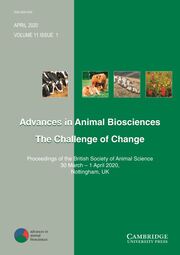This issue of Advances in Animal Biosciences includes papers from two symposia organised by EAAP jointly with other organisations.
The first on a ‘System Approach for improving the sustainability of animal production, health and welfare’ was funded by the EU Steering Committee for EXPO in co-operation with ‘Universities for EXPO’, the Scientific Committee for EXPO of the Municipality of Milan. The aim was to highlight the updates of the scientific research and the best practices adopted by enterprises involved in the animal food chain. Preparation and management of this event has been assigned to the Department of Health, Animal Science and Food Safety of the University of Milan. The subject is of great interest for several reasons, the main one is that the food demand in the world is growing intensively more than the food offer. The demand of food of animal origin weighs heavily on this phenomenon, particularly in countries such as Brazil, Russia, India and China. In fact, the improved economic conditions in these regions have allowed more and more people to have access to this kind of food. Now the issue is to offer good quality and nutritious food for everyone, in order to fully develop the potentiality of the population. This is necessary in particular in developing countries that need to improve the economic and social conditions and where too many people still suffer from hunger and hidden under-nutrition due to vitamins and minerals deficiencies. Under this point of view the presence of meat in a diet, though in the right quantities, can improve the quality of the nutrition, at the same time, it is necessary to have good quality products for a healthy one. The satisfaction of these necessities involves a series of problems: it is necessary to produce more vegetables for animal nutrition, to contrast and reduce environmental impacts caused by animal farming (greenhouse gas emissions, in particular methane from ruminants), to contain natural resources consumption, in particular water.
Therefore the support of the scientific community through investigations, trials, applied good practices is relevant to find the correct and sustainable solutions.
The progress of the scientific research has been important in all these issues; from the genetic improvement and appropriate breeding techniques dedicated to the animal wellbeing to meat and milk quality which has been significantly improved during the last decades (more protein, less fats, etc.). Several researches have been dedicated to the reduction of nitrates derived from animal faeces (a very important problem for some European regions). Several other researches and good practices showed the possibility to reduce the greenhouse gas emissions, by adopting adequate diets for ruminants.
Guaranteeing food of animal origin to answer to the increasing global demand is essential, but without destroying environmental resources, and respecting the reasons of those who do not want this kind of food. Moreover, it is necessary to develop dietary education in all countries, disseminate correct lifestyles, induce people to moderate their consumption and reduce the food waste, in agreement with the human health and environment conservation.
In addition to the Milan event that is well described above by Prof. Sorlini, three other papers were selected from those presented at the XXIV Congreso de la Asociaciòn Latinoamericana de Producciòn Animal (ALPA) that was held in Puerto Varas (Chile) in November 2015. The researches described in the papers from Chile conference fits well with the topics that were discussed at the EXPO conference in Milan and complement the theme of sustainable systems.


